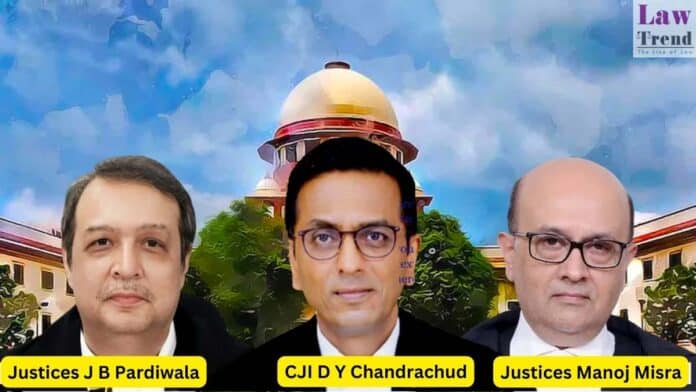The Supreme Court on Tuesday commenced hearing a clutch of as many as 391 petitions challenging various provisions of the Insolvency and Bankruptcy Code (IBC) over claims that they are violative of fundamental rights like the right to equality of those against whom insolvency proceedings are initiated.
A bench comprising Chief Justice D Y Chandrachud and justices J B Pardiwala and Manoj Misra heard senior advocate Abhishek Singhvi, appearing for one of the lead petitioners, Solicitor General Tushar Mehta and others during day-long hearing.
Singhvi dealt with the issue of operation of IBC provisions against guarantors even after the creditors assigned the remainder loan amount to an assignee firm.
“Our law is very clear that the liability of the guarantor is coextensive with that of the principal debtor,” the bench observed.
The bench will continue hearing the submissions in the case on Wednesday.
Earlier, the top court had, on different dates, issued notices on petitions challenging IBC provisions on various grounds. All 391 petitions, including the lead one filed by Surendra B Jiwrajka, were later clubbed together for an authoritative pronouncement on legal issues.
The petition filed by R Shah through advocate Anne Mathew has challenged the constitutional validity of sections 95(1), 96(1), 97(5), 99(1), 99(2), 99(4), 99(5), 99(6) and 100 of the Code.
These provisions deal with the various stages of insolvency proceedings against a defaulting firm or individuals.
“The Impugned Provisions are inherently violative of the principle of natural justice and strike at the root of the right of livelihood, right to trade and profession, and also the right to equality of the Petitioner under Article 21 (right to life), 19(1)(g) (Right to practice any profession), and 14 (right to equality, respectively, of the Constitution,” the plea said.
Also Read
It said none of the impugned provisions contemplated any opportunity of granting hearing to an alleged personal guarantor before appointment of the Resolution Professional and imposition of moratorium on the assets of the personal guarantor.
“Interestingly, Section 96(1) of the IBC imposes the rigour of moratorium upon the alleged guarantor, automatically, upon mere filing of the application under Section 95 of the Code, without any requirement of prior notice which itself is violative of the basic canons of the principles of natural justice.
“Such restrictions on the liberties of a person, including restrictions to discharge any debt, without affording any opportunity of hearing are not only ultra vires of the Constitution but also unknown in law,” it said.
The scheme of the Section 97(5) of the Code does not contemplate any alternative to appointment of a Resolution Professional, it said.




